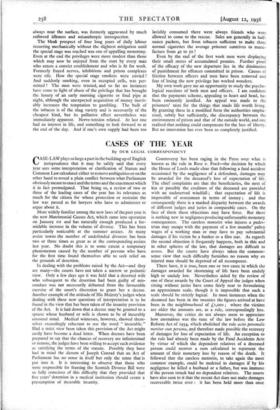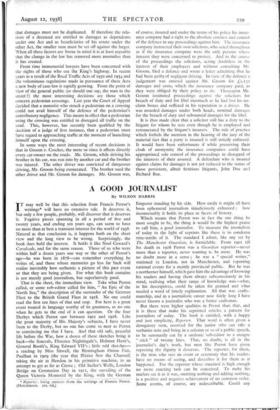CASES OF THE YEAR.
By OUR LEGAL CORRESPONDENT
CASE-LAW plays so large a part in the building up of English jurisprudence that it may be safely said that every year sees some interpretation or clarification of Statute and Common Law calculated either to remove ambiguities or on the other hand to reveal a plain conflict between what Parliament obviously meant to enact and the terms and the enactment which it in fact promulgated. That being, so, a review of two or three of the leading cases of the year has its relevance as much for the citizen for whose protection or restraint the law was passed as for lawyers who have to administer or argue about it.
More widely familiar among the new laws of the past year is the new Matrimonial Causes Act, which came into operation on January 1st and has naturally enough produced a for- midable increase in the volume of divorce. This has been particularly noticeable at the summer assizes. At many assize towns the number of undefended divorces has been two or three times as great as at the corresponding assizes last year. No doubt this is to some extent a temporary phenomenon caused by the number of persons who have for the first time found themselves able to seek relief on the grounds of desertion.
In dealing with the problems raised by the Act—and they are many—the courts have not taken a narrow or pedantic view. Only a few days ago it was held that a deserted wife who subsequent to the desertion had been guilty of mis- conduct was not necessarily debarred from the favourable exercise of the court's discretion to grant her a decree. Another example of the attitude of His Majesty's judges when dealing with these new questions of interpretation is to be found in the view that has been taken of the insanity provision of the Act. It is laid down that a decree may be granted to a spouse whose husband or wife is shown to be of incurably unsound mind. Medical witnesses, however, showed them- selves exceedingly reluctant to use the word " incurable." Had a strict view been taken this provision of the Act might easily have become a dead letter. When doctors have been prepared to say that the chances of recovery are infinitesimal or remote, the judges have been willing to accept such evidence as satisfying the terms of the statute. Possibly they have had in mind the dictum of Joseph Conrad that an Act of Parliament has no sense in itself but only the sense that is put into it. It is interesting to observe that those who were responsible for framing the Scottish Divorce Bill were so fully conscious of this difficulty that they provided that five years' detention in a medical institution should create a presumption of incurable insanity. Controversy has been raging in the Press over what is known as the rule in Rose v. Ford—the decision by which the House of Lords made clear that following a fatal accident occasioned by the negligence of a defendant, damages may be awarded for the deceased's loss of expectation of life. The chief complaints are that the beneficiaries, the next of kin or possibly the creditors of the deceased are provided with an undeserved windfall ; that expectation of life is impossible of assessment in terms of money ; and that consequently there is a marked disparity between the awards of different judges and juries in comparable cases. On the face of them these objections may have force. But there is nothing new in negligence producing unforseeable monetary consequences. The careless motorist who injures a pedes- trian may escape with the payment of a few months' paltry wages of a working man or may have to pay substantial damages if his victim be a banker or a film star. As regards the second objection it frequently happens, both in this and in other spheres of the law, that damages are difficult to assess. But the courts have always taken the common- sense view that such difficulty furnishes no reason why an injured man should be deprived of all recompense.
There have, it is true, been one or two cases in which the damages awarded for shortening 'of life have been unduly high or unduly low. Nevertheless aided by the review of one of these awards by the Court of Appeal the judges when sitting without juries have come fairly near to formulating an approximate scale, though it is impossible that such a scale should be strictly logical. In most instances when the deceased has been in the twenties the figures arrived at have been in the neighbourhood of ka,000 ; where the .victims are older the amounts are, as a rule, correspondingly less.
Moreover, the critics do not always seem to appreciate how anomalous was the state of the law before the Law Reform Act of 1934, which abolished the rule actio personalis moritur cum persona, and therefore made possible the recovery of damages for loss of expectation of life. An exception to the rule had already been made by the Fatal Accidents Acts by virtue of which the dependent relatives of a deceased person could recover a sum calculated to represent the amount of their monetary loss by reason of the death. It followed that the careless motorist, to take again the most common example, could be mulcted in damages if by his negligence he killed a husband or a father, but was immune if the person struck had no dependent relatives. The courts have also seen to it that the recent Act does' not make damages recoverable twice over it has been held more than once that damages must not be duplicated. If therefore the rela- tives of a deceased are entitled to damages as dependents under one Act and as beneficiaries of his estate under the other Act, the smaller sum must be set off against the larger. When all these factors are borne in mind it is at least arguable that the change in the law has removed more anomalies than it has created.
From time immemorial lawyers have been concerned with the rights of those who use the King's highway. In recent years as a result of the Road Traffic Acts of 193o and 1934 and the voluminous regulations made in pursuance of these Acts a new body of case-law is rapidly growing. From the point of view of the general public (or should one say, the man in the street?) the most interesting decisions are those which concern pedestrian crossings. Last year the Court of Appeal decided that a motorist who struck a pedestrian on a crossing could not avail himself of the defence of the pedestrian's contributory negligence. This meant in effect that a pedestrian using the crossing was entitled to disregard all traffic on the road. This, however, has recently been qualified by the decision of a judge of first instance, that a pedestrian must have regard to approaching traffic at the moment of launching himself upon the crossing.
In some ways the most interesting of -recent decisions is that in Groom v. Crocker, the more so since it affects directly every car-owner on the roads. Mr. Groom, while driving his brother in his car, was run into by another car and the brother was injured. The other driver was convicted of dangerous driving, Mr. Groom being exonerated. The brother sued the other driver and Mr. Groom for damages. Mr. Groom was, of course, insured and under the terms of his policy his insur- ance company had a right to the absolute conduct and control of the defence in any proceedings against him. The insurance company instructed their own solicitors, who acted throughout as if the insurance company were the only persons whose interest they were concerned to protect. And in the course of the proceedings the solicitors, acting doubtless in the interest of their employers and without consulting Mr. Groom, filed a defence and wrote a letter admitting that he had been guilty of negligent driving. In view of the defence a judgement was entered against Mr. Groom for £1,132 damages and costs, which the insurance company paid, as they were obliged by their policy to do. Thereupon Mr. Groom instituted proceedings against the solicitors for breach of duty and for libel inasmuch as he had lost his no- claim bonus and suffered in his reputation as a driver. He was awarded damages under both heads, nominal damages for the breach of duty and substantial damages for the libel.
It is thus made clear that a solicitor still has a duty to the . litigant for whom he acts even though he is employed and remunerated by the litigant's insurers. The rule of practice which forbids the mention in the hearing of the jury of the material fact that a party is insured is still strictly enforced. It would have been unfortunate if while preserving their cloak of anonymity the insurance companies could have appropriated sole control of the proceedings in disregard of the interests of their assured. A defendant who is insured against claims for damages is not yet reduced to the status of those persistent, albeit fictitious litigants, John Doe and Richard Roe.







































 Previous page
Previous page